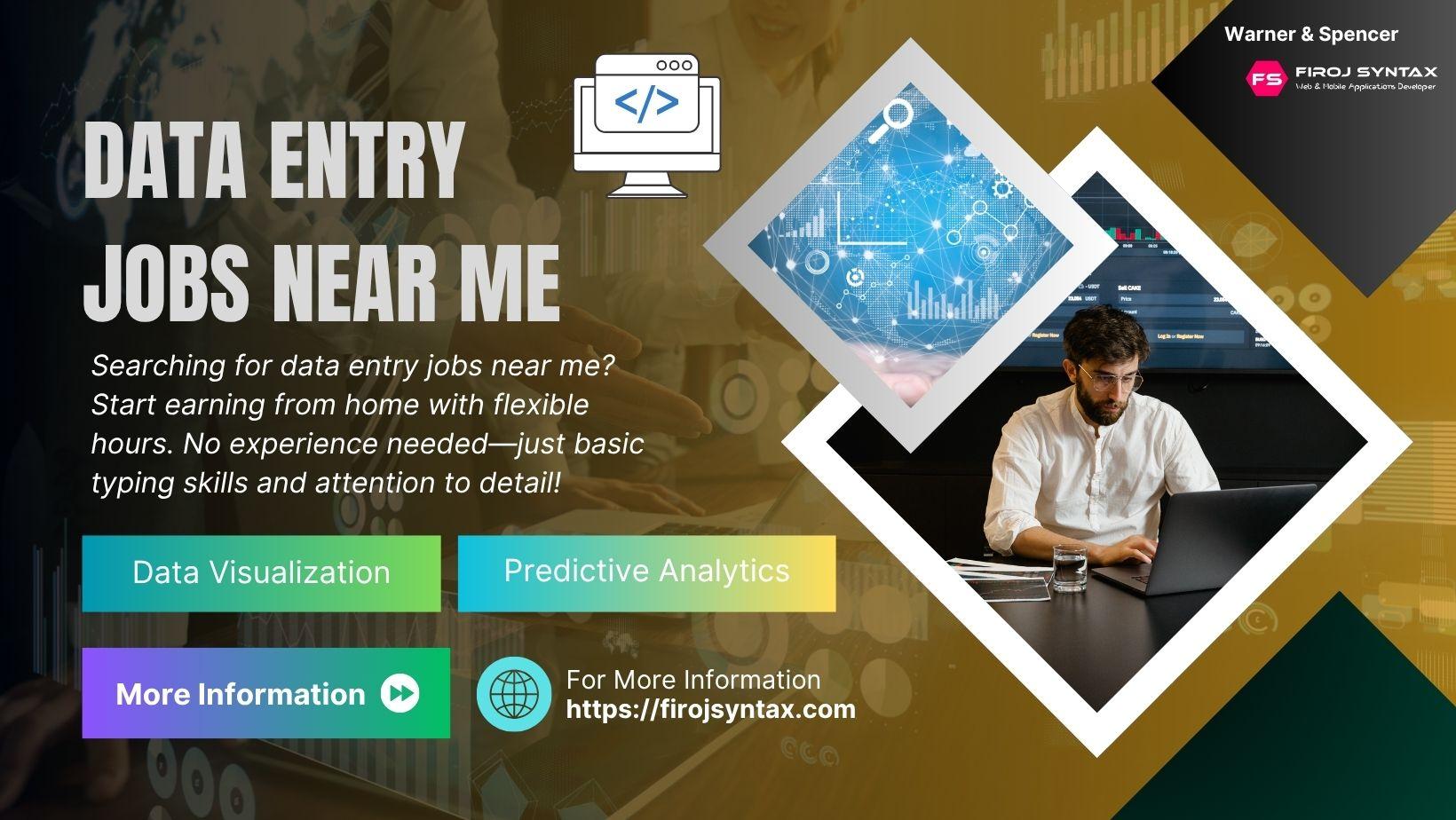Discover how to start data entry jobs near you with no degree needed. Learn skills, tools, and how they can lead to remote work or data science careers.

Searching for data entry jobs near me can feel overwhelming at first. I've been there—wondering if a simple typing job could lead somewhere meaningful. The good news is you don't need fancy degrees to get started. With some basic skills and the right data entry programs, you can open doors to remote work and even step into fields like data science consulting or AI data science. Let's dive in and explore how this easy-to-start path can grow into something much bigger.
If you're searching for data entry jobs near me , it helps to know what you're getting into. At its core, data entry is about turning information into organized digital files — typing names into spreadsheets, updating customer details, or managing online forms. It's the work that keeps businesses running smoothly behind the scenes.
You might find full-time, part-time, or freelance roles, and many can be done remotely from your own home. You'll likely use software like Excel, Google Sheets, or specialized data entry programs designed to speed things up. The tasks may seem simple, but accuracy and speed are the keys to success here.
Who's hiring for data entry jobs near me ? The answer might surprise you — it's not just big companies. Local hospitals, schools, and small businesses often need help keeping their records up-to-date. Thanks to remote work, online stores, tech startups, and consultants nationwide, openings are also posted regularly.

Pro tip: Use job boards with city or country filters to find legit listings nearby. Be cautious — the best gigs come from reputable sources and often offer flexible hours. It's a great way to dip your toes into remote work while staying connected to your community.
Here's the good news: you don't need a fancy degree for most data entry jobs near me . Instead, employers look for solid typing skills and attention to detail. If you can type quickly and accurately, you're already ahead. Basic computer knowledge — like spreadsheets and word processors — is necessary.
Time management and self-discipline are just as important, especially for remote roles.
| Program Name | Cost | Skill Level | Certification |
|---|---|---|---|
| TypingClub | Free | Beginner | No |
| Coursera (Data Entry Basics) | Free/Paid | Beginner | Yes |
| Udemy – Excel for Data Entry | Paid | Beginner | Yes |
Try free data entry programs online to practice and learn faster to boost your chances. And don't forget soft skills like clear communication; they help you stay on track and impress your employer.
4. Where to Find Data Entry Jobs Near Me (Online and Offline)
Finding data entry jobs near me is easier than you think. Start with popular job sites like Indeed, Upwork, Freelancer, and LinkedIn, where you can filter searches by your location. For those who prefer face-to-face connections, visiting local staffing agencies or checking bulletin boards at community centers can uncover hidden gems.
Whether you want to work in person or remotely, both options exist—it just takes some digging. Watch for postings mentioning remote flexibility or part-time hours to fit your lifestyle. The right opportunity could be just around the corner.
5. Where to Find Data Entry Jobs Near Me (Online and Offline)
When I started, I thought data entry jobs were just random gigs hidden in the dark corners of the Internet. Not true. Some of the best places to find them are the most obvious.
Online platforms like Indeed , Upwork , Freelancer , and LinkedIn are goldmines. Use your location filter, or type in "remote" if you want flexibility. Trust me, many companies don't care where you live as long as you get the job done.
Locally , try visiting nearby schools, clinics, or offices. A friend of mine got her first gig by asking her local pharmacy if they needed help digitizing their records. Many small businesses still need someone to handle basic data tasks.
If you're not sure where to start, walk into a staffing agency and tell them you're looking for data entry work, either part-time or remote. It's all about showing up where others don't.
6. How to Avoid Scams and Fake Offers
If it sounds too good to be true, it probably is. I learned the hard way when I almost signed up for a "training program" demanding a $200 upfront fee. Nope.
Here's the deal— real jobs don't ask for money . Any listing that says "pay before you start" is a major red flag. Also, if the job description is super vague but promises high income, that's your second warning bell.
Stick to platforms with a reputation. Check reviews. Google the company. Look for E-E-A-T signs: experience, expertise, authoritativeness, and trustworthiness. If something feels off, walk away. Your gut is often your best firewall.
And if someone rushes you to decide or offers "limited-time" positions, it's probably a scam. Good jobs don't expire in 24 hours.
7. How Data Entry Can Lead to Bigger Opportunities
What starts as a few hours of typing could spark a whole new career. I've seen it. A cousin of mine began with part-time spreadsheet work—and now she's doing data science consulting for an eCommerce brand.
The trick is to upskill while you earn . Get cozy with tools like Excel or Google Sheets. Then, dive into beginner courses on platforms like Coursera or Udemy. Even basic data entry programs can introduce you to how data flows in a business.
Once that is down, explore AI data science or become a virtual assistant. These roles often build on the same foundation: organized thinking, attention to detail, and a willingness to learn.
The best part? You don't need to leap—you can grow into it naturally. Step by step.
8. Real Success Stories: People Who Started with Data Entry
Let me tell you about Sarah. She was juggling online classes and needed income fast. She found a freelance data entry job on Upwork. It's nothing fancy; she catalogs product info for an online store. Six months later, she's a remote virtual assistant, making triple what she earned initially.
Or Jamal—he worked part-time at a call center but taught himself Excel on the side. Now, he's handling client databases for a marketing firm and taking night classes in AI.
These aren't fairy tales. They're real people who treated data entry like a launchpad, not a dead end.
The beauty of "data entry jobs near me" is that they don't just pay bills—they build bridges . You have to be curious enough to cross them.
9. Final Tips for Beginners
If you're just starting out, here's my honest advice: don't overthink it. Begin with small steps. A part-time or freelance gig can teach you a lot without overwhelming you. You don't have to be perfect on day one.
Practice your typing daily—it sounds basic but builds absolute confidence. Use free tools like TypingClub or basic data entry programs on platforms like Coursera to get a feel for the work. These mini habits add up.
Stay patient. Your first job might take a few applications or weeks of effort, but it will come. Once you're in, you'll earn and gain experience that can lead to something bigger—like becoming a virtual assistant, exploring data science consulting , or stepping into AI data science as your skills grow.
If you've read this far, chances are you're serious about starting something new—and that's a great place to be. Data entry jobs near me aren't just easy to begin; they offer a launchpad into a world of remote work and digital skills.
The best part? You don't need to spend years in school. You can go from a curious beginner to a confident professional with free resources, practice, and consistency. Start today, apply tomorrow, and grow into your future—one keystroke at a time.
Q: How much can I earn in a data entry job near me?
A: It depends on your location, speed, and experience. Beginners usually earn $5–$15/hour, but with time and skill, you can scale that up—especially in freelance roles.
Q: Are there any free data entry programs I can try?
A: Yes! Try TypingClub for practice or free beginner courses on Coursera . These can help you build the basics without spending a dime.
Q: Can data entry lead to an AI or data science job?
A: Absolutely. Many professionals start here and grow into roles like virtual assistant, data analyst or even explore fields like data science consulting . You can even break into AI data science over time with the right upskilling (think Excel, Sheets, or basic Python).
Your email address will not be published. Required fields are marked *